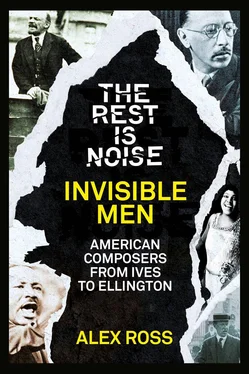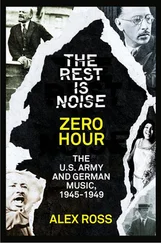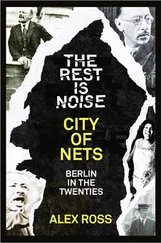Colored People’s Day was to have featured excerpts from Cook’s Uncle Tom’s Cabin, but the singer Sissieretta Jones failed to receive the travel advance that she needed to make the trip, and the performance was canceled. Yet the exposition wasn’t a total waste for Cook. He obtained a letter of introduction to Dvořák, who evidently invited him to study at the National Conservatory. ( Jeannette Thurber, the found er of the conservatory, had a policy of admitting Negro students free of charge.) There is little record of what Cook did during his first years in New York, but circumstantial evidence suggests that racism put a quick end to his dreams. One anecdote is cited in Duke Ellington’s memoir, Music Is My Mistress. Cook makes his Carnegie Hall debut, and a critic hails him as “the world’s greatest Negro violinist.” Cook barges in on the critic and smashes his violin on the man’s desk. “I am not the world’s greatest Negro violinist,” he shouts. “I am the greatest violinist in the world!” Marva Griffin Carter finds no evidence that such an incident took place, but yelling matches probably ensued as the temperamental Cook made the rounds of the concert halls.
Barred from the classical world, Cook got work where he could find it. In 1898 he collaborated with the poet Paul Laurence Dunbar on a musical revue titled Clorindy; or, The Origin of the Cakewalk, which opened on Broadway with an all-black cast. This was, at first glance, yet another self-denigrating minstrel show full of talk of “coons” and “darkeys.” But, as Carter points out, the lyrics often have a hidden sting, making “confrontational jabs” at white listeners. The hit number “Darktown Is Out To night” delivers a prophecy of the coming sovereignty of black music:
For the time
Comin’ mighty soon,
When the best,
Like the rest
Gwine a-be singin’ coon.
When Cook’s mother came to the show, she was distressed to see his Berlin education going to this end. A Negro composer should write just like a white man, she told him. Yet the composer could look back on Clorindy and its successor, In Dahomey, as examples of a black composer finally finding his own voice. “On Emancipation Day,” In Dahomey’s big number, repeats the prophecy of “Darktown” in even starker terms:
All you white folks clear de way,
Brass ban’ playin’ sev’ral tunes
Darkies eyes look jes’ lak moons . . .
When dey hear dem ragtime tunes
White fo’ks try to pass fo’ coons
On Emancipation day.
The first chords of the overture, which recur at the beginning of “On Emancipation Day,” echo the opening of the Largo of Dvořák’s New World Symphony.
Cook’s musicals, sophisticated in technique and assertive in tone, anticipated the spirit of the Harlem Renaissance, which came into its own around 1925. Since the beginning of the century, W. E. B. Du Bois had been calling for a “Talented Tenth” of black intellectuals and artists to lead the masses to a better place in society. The upsurge of artistic activity in Harlem in the twenties fulfilled Du Bois’s prophecy, although the elitism implicit in the phrase “Talented Tenth” would prove problematic. Music was essential to the Re naissance spirit, and Du Bois, the philosopher Alain Locke, and the poet James Weldon Johnson all argued that black composers should avail themselves of European forms, even as they explored the native African-American tradition. Cook himself wrote in 1918: “Developed Negro music has just begun in America. The colored American is finding himself. He has thrown aside puerile imitations of the white man. He has learned that a thorough study of the masters gives knowledge of what is good and how to create. From the Russian he has learned to get his inspiration from within; that his inexhaustible wealth of folklore legends and songs furnish him with material for compositions that will establish a great school of music and enrich musical literature.”
Still, Cook could not break into “straight” composition. In the second de cade of the century, he became a bandleader, putting together a sharp group called the New York Syncopated Orchestra, which later toured Europe under the name Southern Syncopated Orchestra. Although Cook never felt comfortable with jazz—improvisation grated against his conservatory training—he highlighted the new sounds that were emerging from New Orleans, and hired the young clarinet virtuoso Sidney Bechet as his star soloist. The conductor Ernest Ansermet, who took an avid interest in jazz just as it was developing, heard Cook’s orchestra play in 1919 and, with an alertness that has won him a place of honor in anthologies of jazz writing, acclaimed Bechet as a “genius” and Cook as a “master in every respect.” Back in 1893 Anton Rubin-stein had predicted that Negro musicians could form “a new musical school” in twenty-five or thirty years. Twenty-five years later, Ansermet perceived in Bechet’s and Cook’s performances “a highway that the world may rush down tomorrow.”
Cook was hardly the only black musician to turn from classical study to a popular career. Many classically trained black musicians played significant roles in early jazz, giving the lie to the simplistic and racist idea that it was a purely instinctive, illiterate form. Will Vodery worked as a librarian for the Philadelphia and Chicago orchestras in his youth and showed promise as a conductor, but his career took off only when Florenz Ziegfeld, the master showman of Broadway, hired him to arrange music for his Follies. James Reese Europe trained on the violin but found no work when he arrived in New York in 1903; instead, he began playing bar piano, conducting theatricals, and leading bands. His all-black Clef Club Orchestra and Hell Fighters band introduced a broad audience to syncopated music that was a step or two away from jazz. Fletcher Henderson, Ellington’s future rival for the crown of king of swing, started out as a classical piano prodigy; when he went to work with Ethel Waters in New York, he had to learn jazz piano by listening to James P. Johnson piano rolls. Johnson himself, Harlem’s reigning stride pianist, had compositional aspirations that were only partly fulfilled. In a later generation, Billy Strayhorn, destined to win fame as Ellington’s chief collaborator, shone as a composing prodigy in his youth and wowed his high-school classmates with a Concerto for Piano and Percussion.
The same scenario kept repeating. Middle-class parents would send their sons and daughters to Oberlin or Fisk or the National Conservatory, hoping that they could achieve the wonderful things that Dvořák had forecast for African-American music. Hitting the wall of prejudice, these young creative musicians would turn to popular styles instead—first out of frustration, then out of ambition, finally out of pride. The youngest players embraced jazz as their birthright; they gave little thought to Dvořák’s old fantasy of Negro symphonies. Cook, however, never forgot the ambitions that he had nursed as a boy, when he stood on Lookout Mountain. He still dreamed of a “black Beethoven, burned to the bone by the African sun.”
Charles Ives
Inscribed above the stage of Symphony Hall in Boston, one of America’s great music palaces, is the name BEETHOVEN, occupying much the same position as a crucifix in a church. In several late-nineteenth-and early-twentieth-century concert halls, the names of the European masters appear all around the circumference of the auditorium, signifying unambiguously that the buildings are cathedrals for the worship of imported musical icons. Early in the century, any aspiring young composer who sat in one of these halls—a white male, needless to say, blacks being generally unwelcome and women generally not taken seriously—would likely have fallen prey to pessimistic thoughts. The very design of the place militated against the possibility of a native musical tradition. How could your name ever be carved alongside Beethoven’s or Grieg’s when all available spaces were filled? The fact that so many American composers still came forward is a tribute to the willfulness of the species.
Читать дальше












